 Petzlover
Petzlover Chinook is originated from United States but Kaikadi is originated from India. Chinook may grow 24 cm / 10 inches higher than Kaikadi. Chinook may weigh 20 kg / 45 pounds more than Kaikadi. Both Chinook and Kaikadi has almost same life span. Both Chinook and Kaikadi has almost same litter size. Chinook requires High Maintenance. But Kaikadi requires Low Maintenance
Chinook is originated from United States but Kaikadi is originated from India. Chinook may grow 24 cm / 10 inches higher than Kaikadi. Chinook may weigh 20 kg / 45 pounds more than Kaikadi. Both Chinook and Kaikadi has almost same life span. Both Chinook and Kaikadi has almost same litter size. Chinook requires High Maintenance. But Kaikadi requires Low Maintenance
 In the early 20th century, in the small town of Wonalancet, New Hampshire a new breed of dog called the Chinook was born. Developed by Arthur Treadwell Walden, the breed is named after the first male ancestor who was named Chinook. The breed is a rare sled dog and the official dog of the state of New Hampshire. The Chinook was born of a cross between a large Mastiff-like street dog and huskies that were part of the Peary North Pole expedition.
In the early 20th century, in the small town of Wonalancet, New Hampshire a new breed of dog called the Chinook was born. Developed by Arthur Treadwell Walden, the breed is named after the first male ancestor who was named Chinook. The breed is a rare sled dog and the official dog of the state of New Hampshire. The Chinook was born of a cross between a large Mastiff-like street dog and huskies that were part of the Peary North Pole expedition.
Walden was an experienced slender and looking for a dog that was stronger, faster and had more stamina than his current sled dogs. Walden had years of experience including being the trainer and lead on Byrd’s 1929 Antarctic expedition and plenty of Yukon experience. Once he had the male Chinook he bred him with German Shepherds, Belgian Sheepdogs and Canadian Eskimo Dogs at the very least. He then bred those puppies back to Chinook until he had the type and traits he wanted. Following Walden, Julia Lombard and then Perry Greene took over mastery of the breed. From the 1940’s until he died in 1963, Greene was the only person who was breeding Chinooks. So, there were few left after his death. The breed neared extinction by 1981 with only 11 Chinooks available to breed. These dogs were divided between three breeders who saved the breed from becoming extinct.
In 1991, the United Kingdom recognized the Chinook and they were also registered with the UKC. At that time there were about 800 dogs in the breed. To increase the breed, there was a cross-breeding program that took Chinooks and bred them back to the breeds they considered to be apart of the original Chinook lineage. These 4th generation dogs might meet the standards of the Chinook Owners Associations Cross Breeding Program and be accepted as purebred.
In 2001 the Chinook was entered into the AKC Foundation Stock Service and added to the Miscellaneous class of the AKC in 2010. In January of 20113, the Chinook was finally granted full recognition and breed status within the AKC in the working group. He is a large working dog, rugged, patience, loyal and intelligent. He is one of the rarest breeds in the AKC.
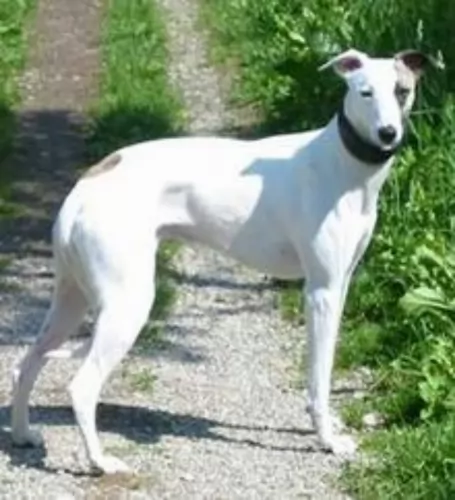 The Kaikadi or Kai Kadi is a terrier dog, hailing from India. Not much is available on the history of the dog, but today you won't easily find original Kai Kadi in India. This is because they have essentially been mixed with stray dogs of India as well as Pariah.
The Kaikadi or Kai Kadi is a terrier dog, hailing from India. Not much is available on the history of the dog, but today you won't easily find original Kai Kadi in India. This is because they have essentially been mixed with stray dogs of India as well as Pariah.
It is for this reason that the dog isn't recognized as a standardized breed by any of the leading kennel clubs.
 The Chinook is a muscular dog, making him a perfect fit to be a sled dog or a hauler of any type. He has a deep chest and powerful muzzle with enduring teeth. The ears can be pricked up or bent and wind-blown. The nostrils of the Chinook are solid black and wide, while the lips are black, the eyes look like almonds and are dark with intelligence in their glance. The feet are firm and oval, the pads cushioned and with dark pigmentation. The tail should not be docked.
The Chinook is a muscular dog, making him a perfect fit to be a sled dog or a hauler of any type. He has a deep chest and powerful muzzle with enduring teeth. The ears can be pricked up or bent and wind-blown. The nostrils of the Chinook are solid black and wide, while the lips are black, the eyes look like almonds and are dark with intelligence in their glance. The feet are firm and oval, the pads cushioned and with dark pigmentation. The tail should not be docked.
The breed has a double coat and hair of medium length The undercoat is soft and thick while the outercoat is close to the body and coarse. The Chinook is usually a tawny, reddish color.
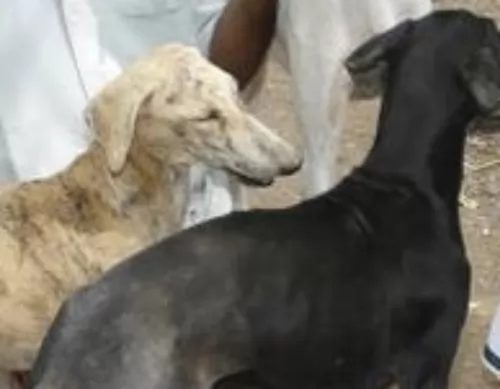 These dog have always been used for hunting, guarding and herding in India and today he makes a good watchdog, watching over his human family.
These dog have always been used for hunting, guarding and herding in India and today he makes a good watchdog, watching over his human family.
It's not a large dog though and he stands at roughly 35 to 45cm in height and weighs 17 to 21kg. He is lean and muscular, looking similar to the Italian Greyhound or Whippet.
He has a short smooth coat and the color can be patterned white, tan and black. The head is long and thin, as are the legs, and his tail is long and thin too. The floppy ears stand erect when alert.
The Kaikadi is an affectionate, alert, energetic dog. He won't do well in a city environment with a tiny garden as he requires a large garden to run in.
He is a dog that will need to be trained and socialized if you want him to be obedient and to get on well with children in the home as well as pets.
He can be a fairly quiet, docile dog inside but outside when there is a game to be had, he becomes lively and animated. They are quite sensitive, so while they get on well with children in the home, he won’t respond well to large families with lots of rowdy, undisciplined children as it makes him anxious.
 This is a playful, affectionate and loyal breed. They have a special love for kids and always want to learn and please you. They are intelligent and very trainable. The Chinook is good with other dogs and as a sled dog they love to work in packs. They can be reserved but they are never aggressive or shy.
This is a playful, affectionate and loyal breed. They have a special love for kids and always want to learn and please you. They are intelligent and very trainable. The Chinook is good with other dogs and as a sled dog they love to work in packs. They can be reserved but they are never aggressive or shy.
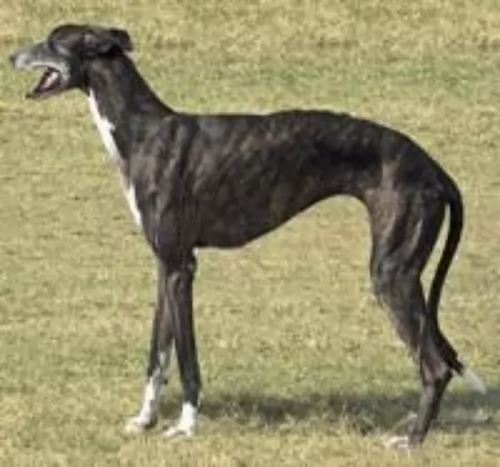 Your Kai Kadi loves running and playing outside, after all he has always been a hunting dog. He will love to spend time with you outside playing.
Your Kai Kadi loves running and playing outside, after all he has always been a hunting dog. He will love to spend time with you outside playing.
The Kaikadi is a low maintenance dog too. Provide your Kaikadi with everything that makes a dog happy and in exchange you’ll get yourself a loyal, loving pet who wants to be your friend.
 For the most part, the Chinook is a healthy dog. There are however some issues they do have to contend with including:
For the most part, the Chinook is a healthy dog. There are however some issues they do have to contend with including:
Sometimes know as Chinook seizures this is really a movement disorder and perhaps not a true epilepsy.
This dermatitis may be hereditary. It causes itchy skin and is actual an immune system issue.
Chinook are known for a variety of gastrointestinal disorders manifested by diarrhea and vomiting.
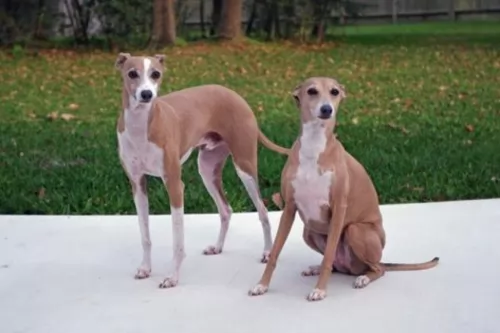 When you’ve got a Kai Kadi, make sure you understand some of the health risks that come along. This is a healthy dog breed so you’re not likely to have much going wrong with him, but you need to know that he can get sick and then you need to have the name of a good vet for medical treatment -
When you’ve got a Kai Kadi, make sure you understand some of the health risks that come along. This is a healthy dog breed so you’re not likely to have much going wrong with him, but you need to know that he can get sick and then you need to have the name of a good vet for medical treatment -
A sudden drop in blood sugar, which is many times brought on by stress, can make your dog lethargic and even have slight tremors in the face. It could be a hypoglycemic attack. See the vet immediately.
The pancreatitis can become inflamed and your dog could be vomiting, have diarrhea and have abdominal pain. There are quite a few things that can cause pancreatitis such as obesity, infection as well as stress.
 Don’t overfeed your dog. Based on how hard he is working for you feed twice a day. Dividing 3 to 5 cups into two meals.
Don’t overfeed your dog. Based on how hard he is working for you feed twice a day. Dividing 3 to 5 cups into two meals.
Although the Chinook is still active in recreational sledding, he is mostly a family pet these days. Given this the Chinook need a good deal of exercise and competition. They are great at search and rescue, dog packing, agility, obedience, herding, carting and skijoring. They need some form of solid exercise for 30 to 60 minutes every day.
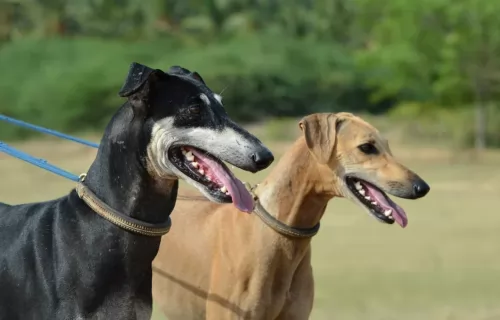 Owning a dog is a responsibility, requiring you to look after a living being just like you would any family member of yours, otherwise why get a dog in the first place?
Owning a dog is a responsibility, requiring you to look after a living being just like you would any family member of yours, otherwise why get a dog in the first place?
You may want a dog for watchdog purposes, but as a living creature, it is important to develop a relationship with your pet and to show him that you love and appreciate him.
There are many things to do to ensure you have a healthy, happy 4-legged canine member in your household
Make sure he has fresh, cool water available to him around the clock.
Provide him with a warm, dry place to sleep.
Provide him with wholesome food to maintain health. There are many excellent commercially manufactured foods on the market. Buy one according to the size and energy levels of your pet. Try to sometimes add cooked home-made food into his kibble such as cooked chicken, brown rice and vegetables as well as some raw meat from time to time. This diet is guaranteed to keep your pet mentally and physically well.
Check your pets nails, ears and eyes regularly. He should be checked for fleas and ticks when you brush him twice a week. Have him examined by a veterinarian as soon as you suspect something is amiss with him. Keep him up to date with his vaccinations.
The Kaikadi is an energetic dog so make sure that you provide him with the opportunity to be exercised. Take him on walks or hikes, play ball and rope games with him and go swimming with him to ensure he remains lean and muscular.
Have him trained and socialized as it takes off the rough-edges of a dog.